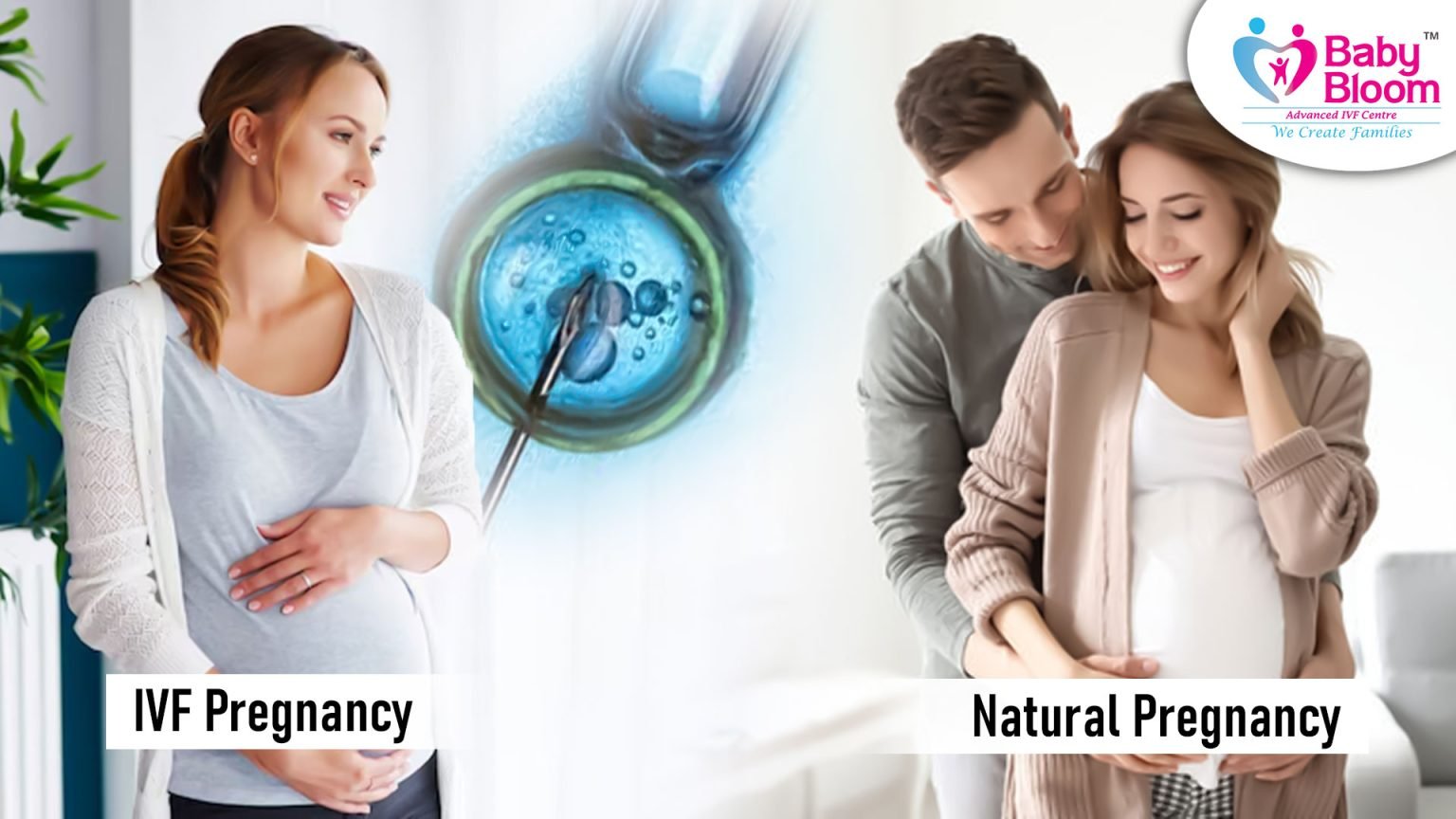IVF Pregnancy vs. Natural Pregnancy: Key Differences Explained

Dr. Pujil Gulati, IVF Specialist with over 13 years of experience in Assisted Reproductive Techniques BabyBloom IVF Gurgaon
Introduction
Bringing a child into the world is a beautiful and life-changing journey, but the path to parenthood varies for everyone. Some couples conceive naturally, while others turn to assisted reproductive technologies like in vitro fertilization (IVF). Understanding the differences between IVF and natural pregnancy is crucial for anyone exploring their options or curious about these unique experiences. This article dives deep into these two paths, comparing everything from procedures to emotional impacts, so you can make informed decisions.
What is IVF Pregnancy?
Understanding the IVF Process
IVF, or in vitro fertilization, is a sophisticated medical procedure where an egg is fertilized by sperm outside the body, in a lab. This process involves several stages:
- Ovarian stimulation: Hormonal injections stimulate the ovaries to produce multiple eggs.
- Egg retrieval: The mature eggs are collected surgically.
- Fertilization: The eggs are combined with sperm in a controlled environment.
- Embryo transfer: Once the embryo develops, it’s implanted into the uterus.
This meticulous procedure has opened doors for millions of couples facing infertility challenges. Thanks to advancements in medical science, IVF success rates continue to improve, offering hope to many.
Common Reasons for Choosing IVF
Couples may opt for IVF due to various reasons, including:
- Infertility: Issues like blocked fallopian tubes, low sperm count, or unexplained infertility often lead couples to seek IVF treatment.
- Genetic Testing: Preimplantation genetic testing ensures embryos are free of hereditary diseases.
- Advanced Maternal Age: For women over 35, IVF often provides a better chance of conception

What is Natural Pregnancy?
Overview of Natural Conception
Natural pregnancy occurs when an egg is fertilized by sperm through unassisted sexual reproduction. The fertilized egg implants itself into the uterine lining, and the pregnancy progresses without external intervention. This biological process is the most common method of conception.
Factors Influencing Natural Pregnancy
While natural pregnancy might seem straightforward, it’s heavily influenced by factors like:
- Age: Fertility declines with age, particularly after 35.
- Lifestyle: Smoking, alcohol, and poor diet can affect conception chances.
- Health Conditions: Conditions like polycystic ovary syndrome (PCOS) or endometriosis can complicate natural conception.
Medical Procedures: IVF vs. Natural Pregnancy
Medical Interventions in IVF Pregnancy
IVF pregnancies require intensive medical intervention, starting with hormonal treatments to stimulate egg production. Regular ultrasounds, blood tests, and multiple appointments are standard. After the embryo transfer, ongoing monitoring ensures the pregnancy progresses healthily.
Natural Pregnancy and Minimal Medical Intervention
In contrast, natural pregnancies generally involve minimal medical involvement, aside from routine prenatal checkups. Ultrasounds and basic tests ensure the baby’s growth is on track, but the process is typically less invasive than IVF.
Success Rates and Challenges
IVF Success Rates and Challenges
Success rates for IVF vary depending on factors like age, egg quality, and overall health. Women under 35 have a higher success rate, often around 40%. However, challenges like the emotional toll, financial costs, and multiple cycles can make IVF a rollercoaster experience.
Natural Pregnancy Success Rates and Risks
Natural pregnancy success rates are generally higher for younger women. However, factors like advanced maternal age, health conditions, and lifestyle choices can lead to complications such as miscarriages or gestational diabetes.
Costs Comparison
Financial Implications of IVF
IVF is known for its hefty price tag, with costs ranging from 90,000 to 2,50,000 per cycle, depending on the location and services included. For many couples, additional expenses like medications and genetic testing add to the financial strain.
Costs Associated with Natural Pregnancy
While natural pregnancies might seem less expensive, healthcare costs can still accumulate. Expenses include prenatal visits, ultrasounds, and delivery charges, which vary significantly based on whether the delivery is vaginal or via C-section.
Emotional and Psychological Aspects
Emotional Journey of IVF Patients
The emotional rollercoaster of IVF is unlike anything else. For many couples, the uncertainty of success can bring anxiety, stress, and even depression. Every stage, from hormone injections to waiting for test results, can feel overwhelming. The pressure to succeed often takes a toll on mental health, especially after failed cycles.
However, the emotional rewards can be equally significant. The joy of a positive pregnancy test or holding a long-awaited baby in your arms often makes the journey worthwhile. Many IVF patients benefit from counseling, support groups, or mindfulness techniques to navigate these challenges.
Psychological Aspects of Natural Pregnancy
Natural pregnancies, though less clinical, come with their own emotional highs and lows. Hormonal changes can amplify emotions, leading to mood swings or heightened anxiety. Couples often face worries about the baby’s health or fear of childbirth.
On the positive side, natural pregnancies often allow parents to bond over shared excitement. Feeling the baby’s first kicks or hearing the heartbeat during a checkup fosters a sense of connection and anticipation. Like IVF patients, natural parents can benefit from emotional support during this transformative journey.
EMI and Financing Schemes for Patients
Pregnancy Experience: Key Differences
Monitoring and Medical Supervision
One of the starkest differences between IVF and natural pregnancy is the level of medical supervision. IVF pregnancies are closely monitored from the start, with frequent ultrasounds, blood tests, and medication adjustments. Regular checkups continue well into the pregnancy to ensure everything progresses smoothly.
Natural pregnancies, on the other hand, typically involve fewer appointments unless complications arise. Most women have routine prenatal visits and ultrasounds at key milestones, which makes the experience feel more laid-back in comparison.
Physical and Emotional Experience
The physical and emotional experiences during pregnancy can also differ. Women undergoing IVF often experience side effects from hormonal treatments, such as bloating, fatigue, and mood swings. These symptoms might persist even after conception due to the controlled nature of the process.
In contrast, natural pregnancies come with a different set of symptoms, from morning sickness to fatigue. Emotionally, IVF pregnancies often carry more stress due to the investment and stakes involved, while natural pregnancies may feel less pressured but still involve plenty of uncertainty.
Birth Outcomes: IVF vs. Natural Pregnancy
Comparing Delivery Methods
One notable difference between IVF and natural pregnancies is the method of delivery. Studies suggest that IVF pregnancies have a slightly higher chance of resulting in caesarean sections (C-sections). This is partly due to the higher likelihood of complications such as multiple pregnancies or preterm labor.
In natural pregnancies, the method of delivery depends largely on the mother’s health and the baby’s position. While some women may still require a C-section, many deliver vaginally without complications.
Long-term Health of the Baby
Concerns about the long-term health of IVF-conceived babies often arise, but research indicates that these children are generally as healthy as those conceived naturally. While some studies suggest a slight increase in preterm births or low birth weights, these outcomes are often linked to the mother’s underlying health issues rather than IVF itself.
Natural pregnancies tend to result in fewer complications, assuming the mother is in good health and there are no genetic issues. Both IVF and natural pregnancies can lead to healthy, thriving babies with proper care and monitoring
Social Stigma and Misconceptions
Addressing IVF Misconceptions
Despite the advancements in assisted reproductive technologies, IVF still carries a certain stigma. Many misconceptions surround the process, such as the belief that IVF babies are less “natural” or that the procedure is a last resort. These myths can create undue pressure on parents, adding to an already challenging journey.
Raising awareness and sharing success stories can help normalize IVF and break down societal barriers. After all, the love and commitment that go into starting a family are what truly matter, regardless of the method.
Societal Views on Natural Pregnancy
Natural pregnancies are often seen as the ideal, but societal expectations can still create challenges. Women who struggle to conceive naturally may face judgment or intrusive questions, while those who conceive unexpectedly might feel unprepared or unsupported.
Breaking these stereotypes and fostering a more open dialogue about all paths to parenthood can help reduce stigma and promote empathy for all parents.
Conclusion:-
Understanding the differences between IVF and natural pregnancy is essential, as they vary in the conception process and associated risks. Despite these differences, both can lead to the happiness of becoming parents and welcoming a healthy baby. It’s crucial for individuals and couples to evaluate their options carefully and choose what suits their needs and circumstances best.
For more clarity on IVF or natural pregnancy, consulting a healthcare provider or fertility specialist is highly recommended. They can offer tailored advice and address any questions. Additionally, trusted websites, support groups, and books can provide helpful information and emotional support throughout the journey to parenthood.
Babybloom IVF Centre, located in Gurgaon, is a leading fertility clinic with a proven track record of helping over 5,000 couples fulfill their dream of having a child. With more than 15 years of experience, Dr. Pujil Gulati, a highly skilled IVF specialist, leads the clinic’s dedicated team. They are known for their compassionate care and advanced fertility treatments. If you are exploring IVF or need help with fertility, Babybloom IVF Centre can guide you every step of the way. To learn more or book a consultation, visit the Babybloom IVF website or call +91 9266045700.
FAQs
- What are the major risks involved in IVF pregnancy?
Risks include ovarian hyperstimulation syndrome, multiple pregnancies, and a slightly higher chance of preterm birth or low birth weight. - Can IVF pregnancies result in twins or multiples?
Yes, IVF often increases the likelihood of twins or higher-order multiples due to the transfer of multiple embryos. - Is natural pregnancy possible after undergoing IVF?
Yes, it’s possible. Many women conceive naturally after completing IVF, especially if the underlying issue resolves or improves. - Are there any long-term health risks for IVF-conceived babies?
Most IVF-conceived babies are as healthy as naturally conceived children, though there may be a slightly higher risk of preterm birth. - How do lifestyle factors impact the success of IVF and natural pregnancies?
Healthy lifestyle choices, including a balanced diet, regular exercise, and avoiding smoking or alcohol, significantly improve the chances of success for both IVF and natural pregnancies.
FAQs
Write your message:-

Social Media Links :-
Welcome to BabyBloom IVF, where your journey to parenthood is nurtured with care, expertise, and the latest advancements in fertility treatment. Located in the heart of Gurgaon, Babybloom IVF is the Best IVF Centre in Gurgaon & leading fertility center dedicated to helping couples achieve their dreams of starting or growing their families.
Contact Us
Address No.1 I, block, 189, near Baani Square, South City II, Sector 50, (Gurgaon) Gurugram, Haryana 122018
Address No.2 Babybloom IVF, Nursing Home, Civil Rd, Company Bagh, Rohtak, Haryana 124001

Brought Happiness to the world
@BabyBloom IVF All Rights Reserved @2025


